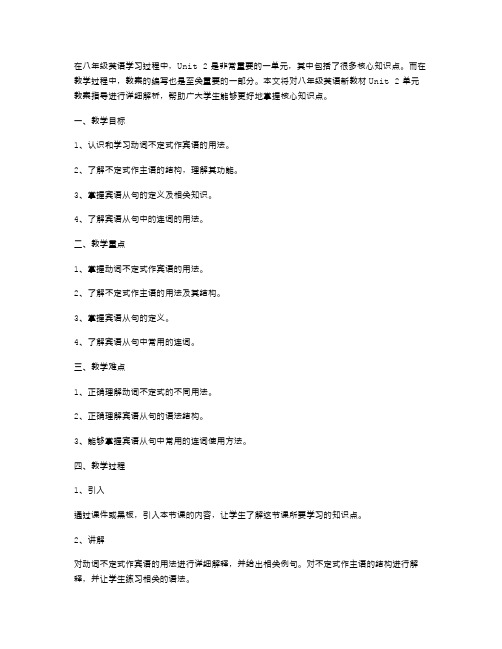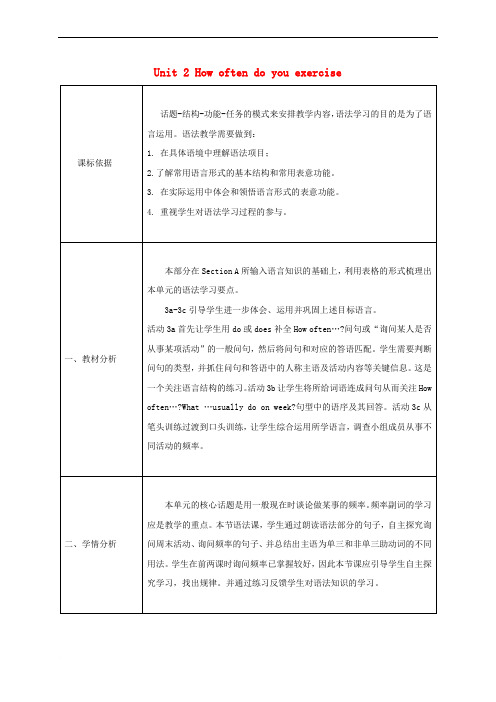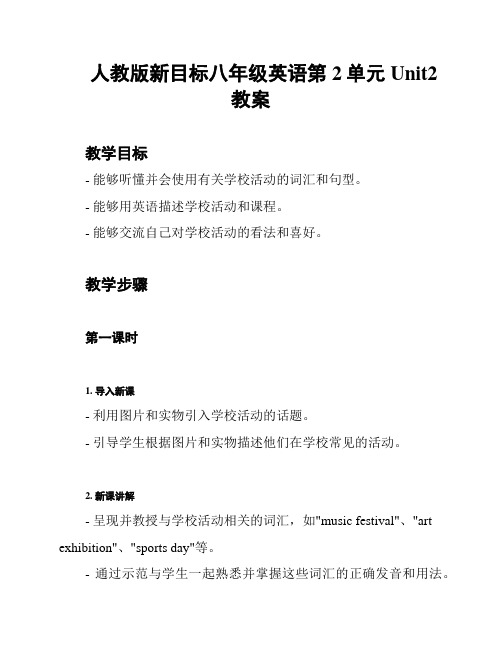新课标八年级英语Unit2教案
人教版新目标八年级英语上册Unit2精品教案

Unit 2 How often do you exercise"(Book ⅢA)Teaching contents and analyzis本单元的教学容围绕"多久做一次运动〞这一话题展开。
Section A是根本语言容的收集和学习,这一局部引导学生通过本课的语言素材进展看图说话、句型演练、实际描述,通过对话表演等使学生能够正确地使用表示做什么活动的词组,多久做一次的句型,从而熟练地谈论多久做一次活动。
Section B是知识的扩展和语言的综合运用,是在Section A的根底上,锻炼学生能够自如地谈论自己的生活习惯。
这些容都与学生日常生活严密相关的,因此在这一课题的教学中,应严密联系学生生活实际,采用多种方式,引导学生学会运用简单的英语进展交际和交流,以提高学生的综合能力。
通过本单元的学习,我们可以引导他们养成良好的生活习惯和饮食习惯,从而合理安排自己的各项工作,享受丰富多彩的校园生活。
Teaching aims and demandsPeriod 5 Section B (3a-Self Check) Teaching periodsPeriod 1 Section A(1a-2d)Teaching GoalsKey words:housework,hardly,ever,once,twice,Internet,program,full,swingKey phrases:how often,on weekends,go to the movies,help with housework,hardly ever,go shopping,once/twice a week/a month,swing danceKey sentences:1.What do you usually do on weekends?I often go to the movies.2.How often do you watch TV?I watch TV every day.Teaching Key PointsTarget language:--What do you usually do on weekends?--I often go to the movies.--Does he go shopping?---No,he never goes shopping.---How often do you have piano lessons?---Twice a week,on Wednesday and Friday.Teaching Difficult Points1.The adverbs of frequency:always,usually,often,sometimes,hardly ever,never2.Target language above.Teaching AidsAn English textbook,a tape recorder,CAI or courseware.Teaching Procedures★Step 1Leading in1.Greetings:Talk about something the students did on summer vacation.2.Check the homework.★Step 2Pre-taskPage 9,1a.1.Look at the picture.2.Name each activity.T:What are they doing"S:They are shopping/reading/exercising/watching TV/helping with housework. (Help the students to answer.)3.Write the activities on the line.4.Check the answers on the board.5.Practice reading.Page 9,1c.1.Focus on the conversation in the box.2.Practice reading.3.Pair-work:What do you do on weekends?I...4.Group-work:Divide the class into groups of four or five. Make conversations. First S1 to S2:S1:What do you do on weekends"S2:I...S1:What does she/he do on weekends"S2:She/He...5.Act out their own dialogues.★Step 3While-taskPage 9,1b.1.Look at each picture above 1a.Tell what the person does on weekends. Check the Ss orally.2.Make sure what they will hear and do.3.Read these adverbs and explain.4.Play the tape twice. Write the letters on the line.Page 10,2a & 2b.1.Read the activities and the answers of "how often〞first.2.Practice reading.3.In 2a we should know the activities you hear. In 2b we should know the answers of how often he does the activities.4.Play the tape for the first time. Ss only listen.5.Play the tape a second time. Ss do 2a.6.Play the tape a third time. Check the answers.7.Play the tape. Ss do 2b.8.Check the answers.In this part,we should pay attention to "how often〞cause of special questions and answers.★Step 4Post-taskPage 10,2c & 2d.1.Focus on the conversation in 2c first.2.Practice reading.3.Read the activities in the left box.4.Fill in the chart.5.Pair-work:Make conversations.6.Make students scan the conversation in 2d.7.Teach and then make Ss role-play the conversation in pairs. In this part,student A will be Jack. Student B will be Claire. As they talk,move around to monitor their work. Offer language or pronunciation support as needed.8.Have a group of students present their conversation to the class.★Step 5Homework1.Practice the conversation in 2d.2.Do the exercises on Page 8 in students' book.Board DesignUnit 2How often do you exercise"The first period Section A(1a-2d)1.Key vocabulary:housework,once,twice,full,how often,on weekends,go to the movies,help with housework,hardly ever,once a week,three times a month2.表示动作的频率由高到低依次是always(100%),usually(80%),often(30%~50%),sometimes(20%),hardly ever(5%),never(0%)。
八年级上册英语《Unit 2》教学设计

Home Talk about your eating habits. Preview 3a and 3b work
According to listening,speaking,reading,students can express their thoughts about their own eating habits.Also,they can use some 反思 frequency words to describe their daily life and activities.However,it’s also a little difficult for them to use the frequency words correctly.In order to make them master the words better,we should exercises more after class.
The Third Period
Steps
Teacher’s Activity
Students’ Activity Preparation
Warm Lead in: Talk about the pictures. Practice the key
Textbook
up
words.
Task 1: Pairwork How often do you drink milk?
Textbook
1 do you drink milk?
example and try to
understand
Show the target language: I drink 2 milk every day.
Look at the example and try to
新版八年级英语上册unit2教案

新版八年级英语上册unit2教案新版八班级英语上册unit2教案1一、教学目标情感目标:通过对音乐类型的介绍,让同学学会正确表达自个儿的情感,激发同学对音乐、对生活的宠爱,培育同学健康的情感品质。
2、学问与技能目标:把握词汇sweet、everyday、simple,理解词汇jazz、classical、folk;了解音乐的分类;学会用“It’s great! I love it! It’s not my favorite, but I don’t mind it.I hate this kind ofmusic.”等句子表达自个儿的情感,提高听、讲、读、写等综合运用语言的力气。
二、教学重、难点1、教学重点:了解音乐的分类;学会用“It’s great! I love it!/It’s not my favorite, but I don’tmind it./I hate this kind of music.”等句子表达自个儿的真实情感。
2、教学难点:能用所学学问表达自个儿对音乐的喜好。
三、教学预备1、依照课文内容预备一个话筒,CAI(课件),录音机。
2、设计一张对不同音乐喜好的表格,设计两张表达情感的句式卡片。
四、教学过程Step l Leading—in activities用多媒体播放一首同学平常学过的英语歌,让同学共同跟随音乐演唱,营造轻松的学习氛围。
询问同学一些询问题:Do you like music?Why?/What do you think of the music? Step 2 Role-task(1)Task1:呈现生词jazz、classical、folk,接着用多媒体播放相对应的音乐,让同学推想jazz、classical、folk的意思,如有错误加以订正。
听过音乐之后,询询问同学听音乐的感受,引导同学认知sweet。
(2)Task 2:阅读2a短文内容,布置略读任务,提出简洁的询问题:How many kinds of music do you learn fromthe passage? What are they?同学回答询问题后,让同学再读一遍课文,布置细读任务,提出更深层次的询问题:Where do people usually enjoy classical music? What is pop music? Who is famous for folkmusic?请同学回答,接着订正答案,跟着录音机读短文一遍。
八年级新教材Unit2教案

八年级新教材Unit2教案教学设计Unit 2 English Around the World The first period: The road to modern English (Reading)教学内容分析本单元以“世界英语”为中心话题,旨在通过本单元的学习让学生粗略了解世界英语的发展状况,认识各种各样具有民族、地域特色的英语以及它们的出现原因和不同之处。
同时让学生能够区分、转述带“命令”或“请求”语气的祈使句,并让学生能用所学构思方法写一篇关于学习经验的作文。
本节课为阅读课,包括Warming-up, Pre-reading,Reading和Comprehending四个部分。
Warming up介绍世界英语,要求学生区分英美语单词。
此部分的目的是丰富学生有关世界英语的知识,激发学生对英语发展历史的兴趣。
Pre-reading 部分设置了两个与主题有关世界英语的问题。
在激活学生已有的知识的同时引导学生为下一步阅读做好准备。
Reading 部分简单地说明英语语言的起源、发展变化、行成原因,以及它的发展趋势。
Comprehending 部分旨在检测学生对课文基本内容的理解程度。
具体操作时根据学生的实际情况对教材有所调整。
Teaching goals1。
Target languagea。
Useful words and expressionsinclude, play a role, because of, international,native, come up, culture, actually, present,vocabulary, usage, identity, such as, rapidly b。
Important sentencesWorld Englishes come from those countries…(P9)Native English speakers can understand eachother…(P9)It became less like German, and more like French…(P10)2。
掌握核心知识点:八年级英语新教材Unit2单元教案指导

在八年级英语学习过程中,Unit 2是非常重要的一单元,其中包括了很多核心知识点。
而在教学过程中,教案的编写也是至关重要的一部分。
本文将对八年级英语新教材Unit 2单元教案指导进行详细解析,帮助广大学生能够更好地掌握核心知识点。
一、教学目标1、认识和学习动词不定式作宾语的用法。
2、了解不定式作主语的结构,理解其功能。
3、掌握宾语从句的定义及相关知识。
4、了解宾语从句中的连词的用法。
二、教学重点1、掌握动词不定式作宾语的用法。
2、了解不定式作主语的用法及其结构。
3、掌握宾语从句的定义。
4、了解宾语从句中常用的连词。
三、教学难点1、正确理解动词不定式的不同用法。
2、正确理解宾语从句的语法结构。
3、能够掌握宾语从句中常用的连词使用方法。
四、教学过程1、引入通过课件或黑板,引入本节课的内容,让学生了解这节课所要学习的知识点。
2、讲解对动词不定式作宾语的用法进行详细解释,并给出相关例句。
对不定式作主语的结构进行解释,并让学生练习相关的语法。
对宾语从句进行详细解释,让学生知道宾语从句的定义及其语法结构。
同时,向学生介绍宾语从句中常用的连词,并给出相关例句进行解释。
3、练习让学生在课堂上进行相关的练习,巩固所学知识。
可以将课堂练习搭配一些文化背景或阅读材料,以帮助学生更好地理解所学内容。
4、总结在课堂结束前,对本节课所学的知识点进行总结,让学生对所学内容有一个清晰的认识。
同时也可以对学生进行一个小小的测试,以检测他们对所学内容的掌握情况。
五、教学方法本单元可以采用多种不同的教学方法,可以根据不同内容的具体情况进行选择。
例如讲授、演示、引导和实践等多种教学方法都可以使用。
六、教学效果评估根据学生在课堂上的表现情况,以及后期练习和测试结果来进行教学效果评估。
如果存在学习问题,及时与学生进行沟通,帮助他们克服问题并提高学习效果。
七、教学的注意事项1、要注意本单元的内容,掌握好每个知识点的具体要求。
2、要注重教学过程中学习的互动和合作。
人教版八年级下册英语Unit2SectionB(2a2e)教学设计

-针对学生的个体差异,给予个性化的指导,提高他们的自信心。
-对学习困难的学生,给予关注和鼓励,帮助他们克服困难,提高学习效果。
5.课后巩固,拓展提高:
-设计富有挑战性的课后作业,让学生在课后巩固所学知识。
-鼓励学生进行拓展阅读,了解更多优秀人物的品质,提高自身素养。
6.情感教育,培养价值观:
2.要求每组选择一个人物,用一般现在时态进行描述,并在组内分享。
3.鼓励学生互相提问、讨论,以提高口语表达能力和思维品质。
4.教师巡回指导,给予个性化的建议和指导,帮助学生提高讨论效果。
(四)课堂练习
课堂练习环节,教师将:
1.设计各种练习题,包括词汇填空、句型转换、阅读理解等,让学生巩固所学知识。
2.要求学生根据课文内容,用一般现在时态描述人物品质,提高写作能力。
2.学会使用一般现在时态描述人物的性格特点,如"He is always polite to others."。
3.能够理解并运用本节课所学的阅读策略,如预测、扫读、精读等,提高阅读理解能力。
4.能够通过小组合作,运用所学知识进行角色扮演,提高口语表达能力。
5.掌握如何用英语撰写人物描述,提高写作能力。
-在教学中融入情感教育,引导学生关注优秀人物品质,培养良好的道德观念。
-通过讨论、反思,帮助学生树立正确的人生观和价值观。
四、教学内容与过程
(一)导入新课
为了激发学生的学习兴趣,本节课将从以下方面导入新课:
1.利用多媒体展示不同国家和地区的人物图片,引导学生观察并讨论他们的性格特点。
2.邀请学生分享他们所了解的优秀人物及其品质,为新课的学习奠定基础。
二、学情分析
八年级英语上册 Unit 2 How often do you exercise Section A(Grammar focus-3c)教案 (新版)人教新目标

3.句型What do you usually do on weekends? How often…?及其答语;
4.复习一般现在时表行为习惯的用法。
教学
难点
运用频率副词谈论自己及他人的日常生活;
一般现在时疑问句中人称主语与助动词的搭配,第三人称单数动词的变化。
Practice in pairs.
A: What does…do on weekends?
B: He / She…..
A: How often does he / she…?
B: He / She .....
4.Sts do some exercises.
1)你通常在Biblioteka 未做什么?____ ____ you _______ do on weekends?
一、教材分析
本部分在Section A所输入语言知识的基础上,利用表格的形式梳理出本单元的语法学习要点。
3a-3c引导学生进一步体会、运用并巩固上述目标语言。
活动3a首先让学生用do或does补全How often…?问句或“询问某人是否从事某项活动”的一般问句,然后将问句和对应的答语匹配。学生需要判断问句的类型,并抓住问句和答语中的人称主语及活动内容等关键信息。这是一个关注语言结构的练习。活动3b让学生将所给词语连成问句从而关注How often…?What…usually do on week?句型中的语序及其回答。活动3c从笔头训练过渡到口头训练,让学生综合运用所学语言,调查小组成员从事不同活动的频率。
4.询问活动频率的问句How often…?及其答语;
5.询问某人是否从事某项活动的问句及其答语6.复习一般现在时表行为习惯的用法;
人教版新目标八年级英语第2单元Unit2教案

人教版新目标八年级英语第2单元Unit2教案教学目标- 能够听懂并会使用有关学校活动的词汇和句型。
- 能够用英语描述学校活动和课程。
- 能够交流自己对学校活动的看法和喜好。
教学步骤第一课时1. 导入新课- 利用图片和实物引入学校活动的话题。
- 引导学生根据图片和实物描述他们在学校常见的活动。
2. 新课讲解- 呈现并教授与学校活动相关的词汇,如"music festival"、"art exhibition"、"sports day"等。
- 通过示范与学生一起熟悉并掌握这些词汇的正确发音和用法。
- 操练这些词汇,并与学生一起编制句子来描述学校活动。
3. 听力训练- 播放关于学校活动的对话,要求学生仔细听并选择正确的图片。
- 学生互相对话,讨论听到的对话内容。
4. 对话练- 分组或两人一组,让学生模仿对话,表演关于学校活动的场景。
- 鼓励学生用英语进行自由对话,并互相分享自己参与过的学校活动。
5. 作业布置- 课堂分发作业卷,要求学生写一篇短文,介绍自己最喜欢的学校活动,并陈述原因。
第二课时1. 短文分享- 学生轮流与同桌分享自己写的短文。
- 鼓励其他学生提出问题或表达对短文的意见和建议。
2. 阅读训练- 学生阅读一篇关于学校活动的短文,并回答相关问题。
- 教师引导学生理解短文的内容,帮助他们解决阅读中遇到的问题。
3. 语法讲解- 教授句子结构"What do you think of + 学校活动?"和相应的答语。
- 帮助学生理解并掌握这种句子结构的用法。
4. 语法练- 学生分组或两人一组,互相提问"What do you think of + 学校活动?"并回答对方。
- 引导学生用所学词汇和句型互相交流和讨论自己对学校活动的看法和喜好。
5. 总结课堂内容- 教师带领学生回顾本节课所学的词汇、句型和语法。
- 1、下载文档前请自行甄别文档内容的完整性,平台不提供额外的编辑、内容补充、找答案等附加服务。
- 2、"仅部分预览"的文档,不可在线预览部分如存在完整性等问题,可反馈申请退款(可完整预览的文档不适用该条件!)。
- 3、如文档侵犯您的权益,请联系客服反馈,我们会尽快为您处理(人工客服工作时间:9:00-18:30)。
Unit 2 I’ll help to clean up the city park.Section A 1 (1a-2d)一、教学目标:1. 语言知识目标:1) 能掌握以下单词:clean up, city, cheer, cheer up, give out, volunteer, notice, used to, lonely,能掌握以下句型:① You could help to clean up the city parks.② We should listen to them and care for them.2) 能了解以下语法:情态动词could, should的用法;用should或could提出建议并对别人的建议作出评价。
如何表达主动提供帮助。
2. 情感态度价值观目标:在授课过程中渗透助人就是助己,助人收获快乐的情感目标,使学生在谈论如何为别人提供帮助的对话中能意识到尽己所能,帮助他人,乐于奉献是一种良好的品德,培养学生为他人着想,热爱公益事业,乐于助人的优良品质。
二、教学重难点1. 教学重点:1) 掌握这些短语动词的构成和用法:clean up, city, cheer, cheer up, give out, volunteer, notice, used to, lonely2) 学会提供帮助的基本句型: I’d like to work outside. I’ll help clean the city park. You could give out food at a food bank.2. 教学难点:学会提供帮助的基本句型三、教学过程Step 1 Warming up1.播放学生志愿者进行义务帮助别人的活动视频,通过询问他们以下问题来引导学生们了解社会上一些的志愿们进行的活动。
T: Who are they?S: They are volunteers. They usually volunteer to help others.T: How could we help people?S1: We could clean up the parksS2: We could help sick people in the hospital.S3: We could help plant trees. …Step 2 New words1. city n. 城市E.g. The library is in the north of the city. 图书馆在城市的北部。
2. notice n. 公告牌;通告;布告e.g. Please read the list on the notice board. 请读公告板上的名单。
3. sign n. 标志;信号e.g. Look around, we could see no sign of life. 环顾四围,我们看不出一点生命的迹象。
4. volunteer v. 义务劳动,自愿做volunteer to do sth. 义务自愿做某事e.g. Many people volunteer to work on the farm. 很多人志愿到农场去工作。
5. clean up 打扫;清除e.g. The students take turns to clean up their classroom. 学生们轮流打扫教室。
6. give out 分发;散发e.g. Please help me give out these test papers. 请帮我将这些试卷发下去。
7. cheer v. 欢呼; 喝彩e.g. Cheer up. The news isn’t too bad. 振作起来,消息还不算太坏。
8. lonely adj. 孤独的;寂寞的e.g. I don’t feel lonely because I made new friends here. 我不觉得孤独因为我交了新朋友。
9. used to 曾经,过去e.g. Jack used to be short, but now he’s tall. 杰克过去很矮,但现在高了。
Step 3 Discussion1.1a. Look at the ways you could help others. Then list other ways.2. Ss discuss with their partners and write the ways one could help others:①Help plant trees by the river.②Help clean up the city park.③Visit the old people in the old people’s home.④Help young kids to learn English.Step 4 Listening1. T: Tell Ss to read the sentences in the chart. Make sure they know the meaning of the sentences.2. 1b. Play the recording for the Ss to listen and number the ways the boy and girl could help others.___The girl could visit the sick kids in the hospital to cheer them up.___ The boy could give out food at the food bank.___ The girl could volunteer in an after-school study program to teach kids.___ The boy could help to clean up the city parks.(Key: 3, 2, 4, 1)Step 5 Pair work1. Let Ss read the conversation in the picture.2. 1c. Use the information in the chart of 1b to make other conversations.A: I hope to work outside.B: You could help to clean up the city parks. ……3. Let some pairs act out their conversations.Step 6 Listening1. 2a:T: A group of students are planning a City Park Clean-up Day. Listen and check (√) the things they are going to do to tell people about it.1. Look at the pictures in 2a. Discuss the things they are going to do.2. Play the recording for the Ss to listen and check the pictures.3. Play the recording again to check the answers.Answers: b, c, e2. 2b:1. Let Ss read the sentences below. Explain some main sentences for the Ss. Make sure they know what to do.2. Play the recording for the Ss to write the correct words in the blanks.1). We need to _____ ___ ____ a plan to tell people about the city park clean- up.2). Clean-up Day is only two weeks from now. We can’t ___ ___ making a plan.3). We could ___ ___ signs.4). Let’s make some notices, too. Then I’ll ____ them ____ after school.5). We could each ____ ___ 10 students and ask them to come.3. Play the recording again to check the answers.Answers: 1. come up with 2. put off 3. put up 4. hand, out 5. call upStep 7 Pair work1. 2c. Tell Ss to make a conversation using the information in 2a and 2b.2. Let one pair to read out their conversation first.e.g.A: We need to come up with a plan for the City Park Clean-Up Day.B: Let’s have lunch first.A: No, we need to start now. Clean-Up Day is only two weeks from now.B: You’re right. We can’t put off making a plan. As we talk, I’ll write down allour ideas. Then we can decide which ideas are best.A: Let’s make some notices, too. Then I’ll hand them out after school.B: And we could each call up ten students and ask them to come.3. Ss act the conversation in pairs. Ask some pairs to act out their conversationsStep 8 Reading and Role-play1. Read the conversations and answer the two questions:① Where’s Helen going to work this summer?__________________________________② What did Tom do to help the old people?____________________________________Answers: She’s going to work in an old people’s home.Reading the newspaper or just talking to the old people.2. Read the conversation after the teacher.3. Practice the conversation with their partner. Then let some pairs to act out the conv ersation.Step 9 Language points1. They told me stories about the past and how things used to be.used to do sth. 过去常常做某事;表示过去习惯性、经常性的动作或状态,暗指现在已经不存在。
